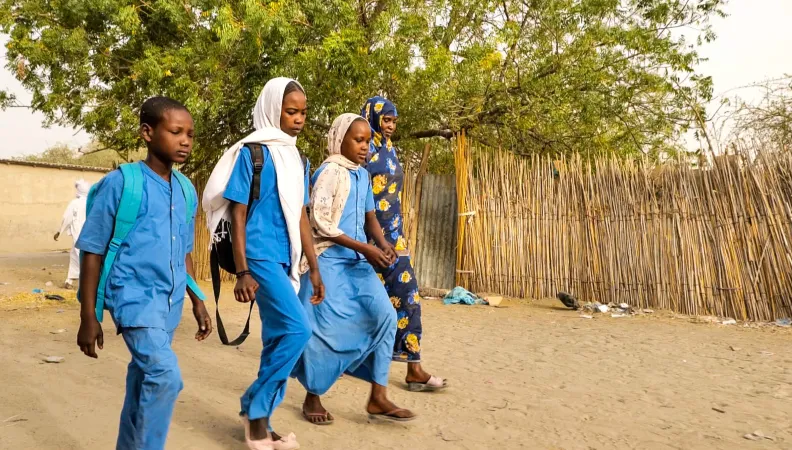 Schoolchildren in Chad. Arab-Islamic education in the Sahel remains poorly understood, despite being a key component for grasping and managing the region’s education systems. This research project, entrusted to IRD, aims to improve knowledge about this educational offering, its learners, and how it is addressed by public policies—ultimately to inform the decisions of policymakers in the Sahel region.
Schoolchildren in Chad. Arab-Islamic education in the Sahel remains poorly understood, despite being a key component for grasping and managing the region’s education systems. This research project, entrusted to IRD, aims to improve knowledge about this educational offering, its learners, and how it is addressed by public policies—ultimately to inform the decisions of policymakers in the Sahel region.
Context
While significant progress has been made in access to education in the Sahel since the 2000s, major challenges remain in terms of access, quality of teaching, and reducing inequalities—particularly between girls and boys, and between urban and rural areas.
In this context, many school-age children are educated through religious-based, mostly Arabic-language education systems rooted in Islam. Deeply embedded in many societies, this so-called “Arab-Islamic” education is highly diverse. It spans a continuum from highly informal, family-based units focused exclusively on religious instruction, to more formal institutions that are partially or fully integrated into public education systems, as well as a range of evolving, intermediate forms.
This widespread educational reality cannot be ignored in the design of local public education policies.
READ IN THE CONVERSATION
Arab-Islamic education in Sub-Saharan Africa: going beyond clichés to build the future
Objectives
The purpose of this study is to contribute to the production of updated and relevant knowledge on Arab-Islamic education in the Sahel—a complex and deeply rooted phenomenon that is widespread across Sahelian societies but remains largely overlooked by both research and public policy. The project also aims to inform policymakers in Sahelian countries, as well as international donors, by providing them with the information needed to design and conduct education policies.
A nuanced understanding of the various forms of arabo-Islamic education is a prerequisite for any intervention—whether to regulate the most controversial practices, to integrate this educational offering into national education and vocational training policies, or to support a system that may prove particularly relevant in times of crisis, especially in the context of insecurity.
Method
As the first large-scale study of arabo-Islamic education across six Sahelian countries, this research project was conducted by a multidisciplinary and multinational research team, coordinated by Dr. Hamidou Dia (IRD).
The project relied on extensive inventories—including inventories of existing research, grey literature, educational institutions, quantitative data, and press articles—combined with field surveys and interviews with key actors involved in Arab-Islamic education. A series of research workshops and stakeholder dialogues helped discuss research findings, feeding into the development of country reports and a regional synthesis (available in the section below). All reports followed a common framework to allow for cross-country comparisons and the identification of transnational or regional trends.
Results
The study confirms the dynamism of Arab-Islamic education in the Sahel, shown in particular by the renewal of audiences. In Chad and Niger, more than 50% of students are girls, and the presence of the middle classes has increased. The re-emergence of Arab-Islamic universities in some countries (notably in Niger and Mali) also shows this dynamism.
The study highlights the diversity of Arab-Islamic education funding resources, which vary widely from country to country and from school to school. Depending on the context, the importance of resources coming from abroad gives a significant weight to foreign actors and dynamics in the evolution of Arab-Islamic education.
The study also shows that the positioning of this offer vis-à-vis the State varies according to the actors, schools of thought, forms of intervention and methods of financing. Depending on the type of educational offer, the place of residence or the profiles of the pupils, Arab-Islamic education can either be complementary to or a substitute for classical education, which is the case especially in regions where public services are destabilized.
You can find below the various research papers related to this research program:
Research findings
This study confirms the existence of a plural and evolutionary educational offer, with the emergence, in recent decades, of new formats, sometimes pushing towards a modernization of education, sometimes towards a return to traditions, with tensions between actors and/or important intra-national divisions around religious and linguistic issues.
The positioning of this offer vis-à-vis the State and the institutions varies. In some countries, attempts at reform by the State ended up in crystallizing tensions and confirmed the duality of the system. Nevertheless, the growth and dynamism of this educational offer in the region calls for a deeper exploration of the possibilities of establishing bridges with secular education.
Highlighting the diversity of this educational offer and the actors who carry it, this research project helped to understand better Arab-Islamic education and to guide the decision-making of AFD, its Sahelian partners or donors.
Contacts
- Dr Hamidou Dia, socio-anthropologist, research officer at IRD
- Linda Zanfini, research officer at AFD
Read also
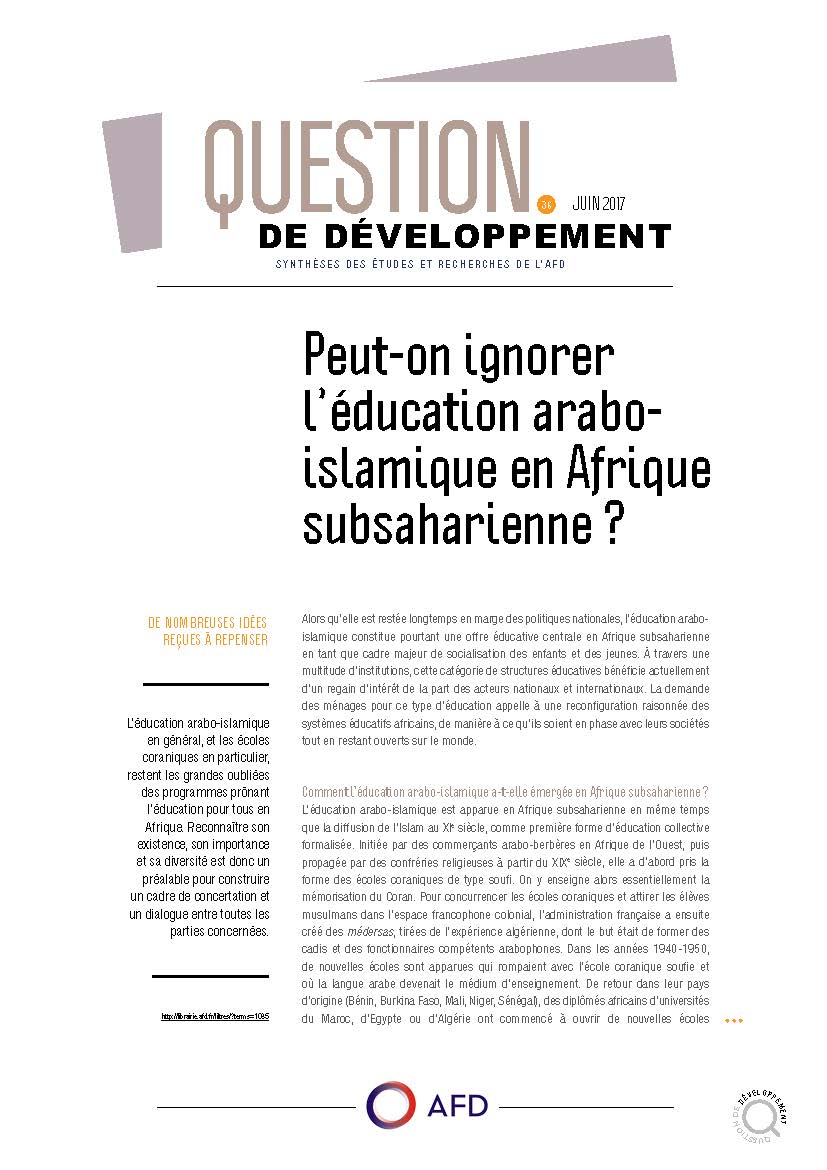
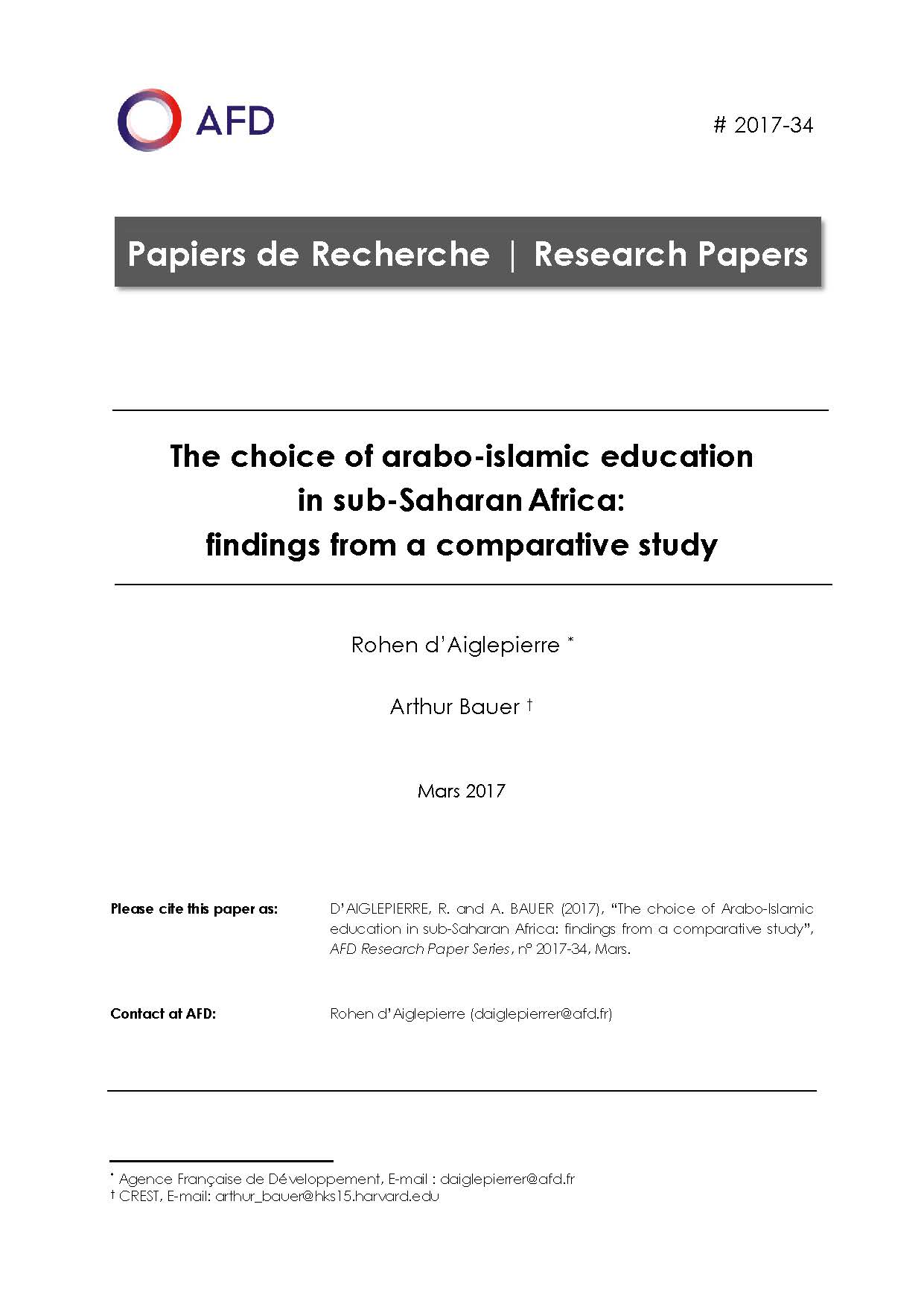
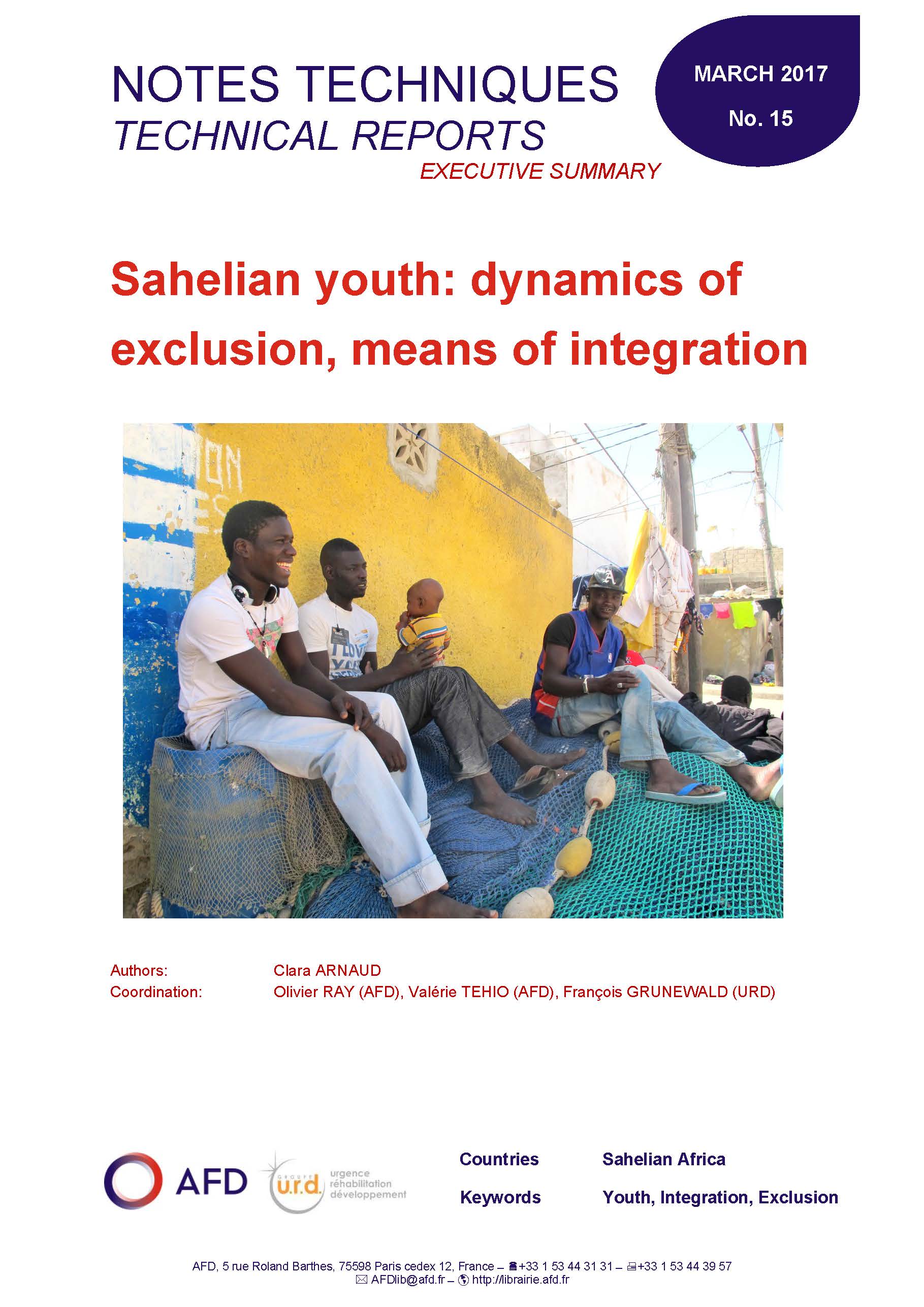
 This project aims to strengthen skills and synergies in a regional centre of expertise in international development, located in the city of Clermont-Ferrand (France), and its international outreach. This involves funding training activities and research capacity building for stakeholders from the Global South (executives, young researchers, etc.), as well as research activities on development.
This project aims to strengthen skills and synergies in a regional centre of expertise in international development, located in the city of Clermont-Ferrand (France), and its international outreach. This involves funding training activities and research capacity building for stakeholders from the Global South (executives, young researchers, etc.), as well as research activities on development.
Context
Clermont-Ferrand is a hub of expertise in development economics recognized at the French and international level, thanks to the research activities of the Foundation for Studies and Research on International Development (FERDI). Training courses aimed at executives and future decision-makers in the countries in the Global South, provided in particular by the Centre for International Development Studies and Research (CERDI) since 1976, also contribute to this recognition.
The presence of a branch of the Global Development Network (GDN) will now strengthen this hub. This international organization's mission is to strengthen research capacities in Global South countries wishing to benefit from the city's dynamic context.
Through AFD, the French State supports the research and training activities of the Clermont International Development Hub and the establishment of the Clermont-Ferrand branch of GDN within the framework of a single project. This project aims to strengthen the ecosystem of local expertise and to develop synergies between the actors concerned for the benefit of their partners in the Global South.
Goal
This project has three complementary objectives:
- Support for the creation in Clermont-Ferrand of a branch office of the GDN, to enable the network to continue from France its flagship activities (such as its annual conference and the Global Dev blog), as well as to launch an ambitious programme to simultaneously fund research production and capacity building of African research institutions;
- Support for FERDI’s research activities, to enable the foundation to gain visibility and influence on sustainable development issues;
- Strengthening of FERDI’s training activities in partnership with the University of Clermont-Auvergne, including the Master’s degree in “Project Management for Development” (MODEV), which specifically targets executives in countries in the Global South, and setting up additional training activities (development of short and/or distance courses, support for doctoral courses in the South).
Results
The expected impacts of the project are:
- For the actors of the Clermont Hub: strengthening the influence and outreach of the Clermont pole and its actors, allowing them to become a reference on development issues in national and international debates.
- For the partners of the Clermont hub in the Global South, and in particular in French-speaking Africa:
• Improving the skills of managers who receive training (women and men) in the management of development policies and projects;
• Strengthening the research capacities of researchers and partner institutions in the Global South on sustainable development issues, as well as their capacity to participate in public debate;
• Development and/or consolidation of networks of researchers and learners in beneficiary countries;
• Improved public policy dialogue, so that development policy-making in AFD’s partner countries can benefit from the insights of locally based research.
Contact:
Linda Zanfini, research officer at AFD
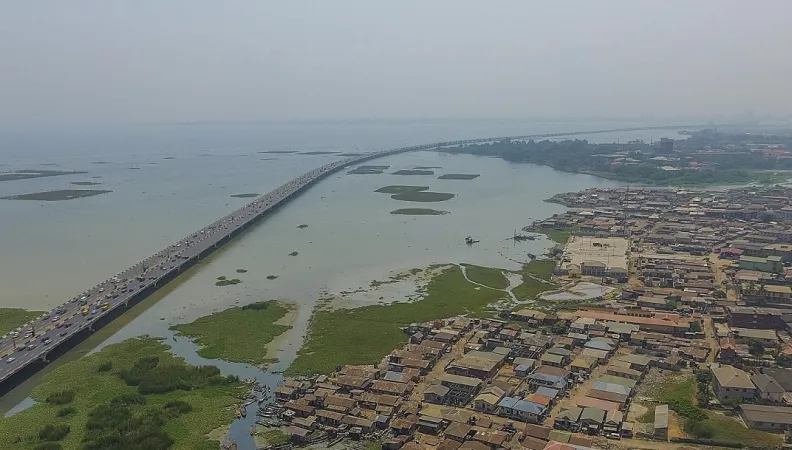 The coastline of the Gulf of Guinea is lowly elevated and particularly vulnerable to sea level rise triggered by climate change. However, in some places, another important factor has to be taken into account to correctly assess the exposure of inhabitants and ecosystems: the gradual lowering of the land surface. The objective of this research program is to quantify this phenomenon and to understand drivers and processes, especially in coastal megacities and deltas.
The coastline of the Gulf of Guinea is lowly elevated and particularly vulnerable to sea level rise triggered by climate change. However, in some places, another important factor has to be taken into account to correctly assess the exposure of inhabitants and ecosystems: the gradual lowering of the land surface. The objective of this research program is to quantify this phenomenon and to understand drivers and processes, especially in coastal megacities and deltas.
Context
The densely populated and lowly elevated coastline of the Gulf of Guina is particularly exposed to coastal erosion and sea-level rise. The entire coastline is currently experiencing alarming erosion rates, ranging from 1 to 15 meter per year between Côte d’Ivoire and Nigeria, mostly because of human activities. The problem is well studied and various programs aim to put in place coastal protection measures. By contrast mid- and long-term vulnerability to sea-level rise triggered by climate change has received less attention in this region.
In addition, to assess the various risks induced by sea-level rise, it is also necessary to consider land surface movements. The gradual lowering of the land surface in some places is called subsidence. The phenomenon is widespread at the global scale, especially in coastal megacities and deltas: 51 to 71% of present-day relative sea-level rise experienced by people worldwide is actually caused by subsidence. The rate can reach several centimeters per year in some places, however coastal subsidence is globally critically under-quantified, and the Gulf of Guinea region is no exception to this.
Objectives
This research program aims to fill the lacune in knowledge on coastal land subsidence and relative sea-level rise along the Gulf of Guinea. It will provide useful space-borne quantifications of current coastal subsidence rates, assess the driving forces of land subsidence and provide first projections of potential future subsidence using numerical models.
Impact will further be created by collaborating with local institutes, connecting to other projects and disseminating findings, data and tools to local stakeholders.
One of the long-term objectives is also to create awareness and agenda setting of this issue of relative sea-level rise in the region, in order to support sustainable development or adaptation projects in coastal areas and policymaking in the region.
Method
The first working group will assess current subsidence rates for the whole coastline, using satellite data to monitor vertical land movement over several years. The results will be combined to satellite elevation data to provide a first assessment of the areas that could be flooded in future decades.
The second working group will focus on the city of Lagos and surroundings, to provide an in-depth analysis of subsidence and to understand drivers and processes. The research team will build a process-based numerical model of subsidence to provide projections of future subsidence rates according to different scenarios.
Then, the methods developed for Lagos will also be applied to 3 or 4 other areas, coastal megacities or deltas, identified as “hotspots” for relative sea-level rise by the first working group.
Knowledge exchange events (seminars and workshops) will also be regularly organized, to disseminate research findings and build a regional community of interest on subsidence and relative sea-level rise.
Results
Results will be shared through scientific papers, technical reports, on-line databases and policy briefs. They will provide valuable information for policymakers and coastal (infrastructural) development projects potentially impacted by relative sea-level rise. In particular, results will help to better calibrate coastal adaptation measures and may also identify areas where the efficiency of natural coastal defences could fail in the future. Understanding the drivers of subsidence will also help to identify potential mitigation measures. The project will also foster public policy dialogue on coastal vulnerability, to favor adaptation projects.
In November 2023, a Research Conversations webinar provided an overview of the current state of knowledge on these issues in the region. The replay is available below:
The ENGULF project team then organized a webinar series to present the main findings of the ENGULF project. The replays are available below.
- Session 1: "Sinking Shores, Rising Concerns: Coastal Land Subsidence and its Implications for the Future of Ghana's Volta Delta" (April 4, 2024). Prof. Kwasi Appeaning Addo and Dr. Selasi Yao Avornyo presented their research work carried out at the University of Ghana.
- Session 2: "Insights into Increasing Land Subsidence along Nigeria's Gulf Coast" (May 2, 2024). Dr. Femi Ikuemonisan presented his research work carried out at the Lagos State University of Education (Lagos, Nigeria).
- Session 3: "Unraveling Gulf of Guinea's land subsidence dynamics using InSAR post-processing insights". Dr. Roberta Boni presented her research work carried outa at the University School for Advanced Studies IUSS Pavia (Italy).
A West African international workshop, organised in November 2024 in Ghana, focused on the challenges of coastal land subsidence. The summary video is available by clicking here.
Download the final report
- Comment évaluer les risques d'inondation dans les zones côtières de basse altitude où on manque de données ? La précision des données sur l'élévation est déterminante (April 2024)
- A scoping study on coastal vulnerability to relative sea-level rise in the Gulf of Guinea: Coastal elevation and literature review (June 2023)
- A scoping review of the vulnerability of Nigeria's coastland to sea-level rise and the contribution of land subsidence (June 2023)
- Vulnerability of Ghana's coast to relative sea-level rise: A scoping review (June 2023)
- A scoping review of coastal vulnerability, subsidence and sea level rise in Ghana: Assessments, knowledge gaps and management implications (Quaternary Science Advances, October 2023)
- The contribution of coastal land subsidence to potential sea-level rise impact in data-sparse settings: The case of Ghana’s Volta delta (Quaternary Science Advances, June 2024).
Contacts
- Marie-Noëlle Woillez, research officer on climate change impacts, AFD
- Marine Canesi, research officer, AFD
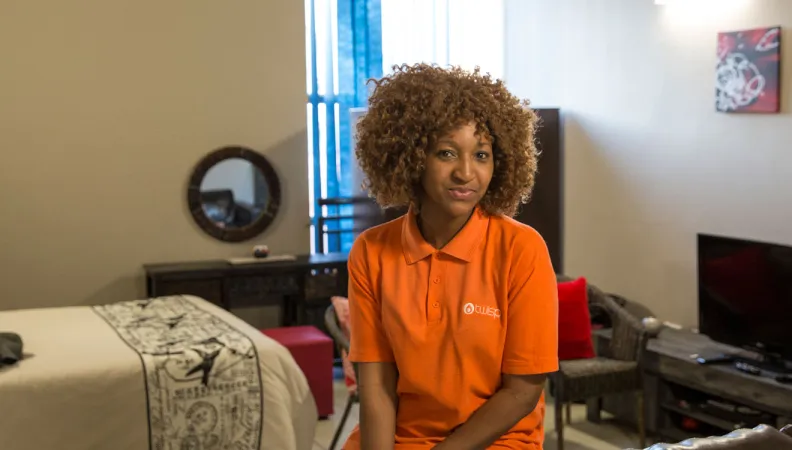 Legal notice EU (project) The CEQ Assessment is a tool that analyzes the impact of taxation and social spending on inequality and poverty, allowing governments to assess the redistributive and poverty-reduction impact of their fiscal policy.
Legal notice EU (project) The CEQ Assessment is a tool that analyzes the impact of taxation and social spending on inequality and poverty, allowing governments to assess the redistributive and poverty-reduction impact of their fiscal policy. In the first phase of the project (2018-2020), Agence Française de Développement (AFD) and the Global Development Network (GDN), in partnership with the Commitment to Equity (CEQ) Institute as well as local universities and local authorities, joined forces to implement the CEQ assessment in four African countries: Morocco, South Africa, Cameroon and Kenya.
In order to document its five-year planning process, Senegal requested the support of AFD and GDN to study the impact of fiscal and social reform scenarios. A second phase of the project, focusing on Senegal but also on methodological issues, is thus taking place over the 2023-2024 period.
Context
In the first phase of the project, Morocco, South Africa, Cameroon and Kenya were selected to participate in the research, analysis, and policy recommendations program, which significantly enhanced the evidence base for efficient and thoughtful redistributive fiscal policy that protects poor and vulnerable households from further impoverishment. Each of these countries learned from, and in some cases incorporated, the successful programmatic experiences from the others. The work program that the AFD-CEQ partnership encompasses also promoted skills sharing and capacity building between countries.
This project was part of the first phase of the Research Facility on Inequalities, coordinated by AFD and funded by the European Union over the 2017-2020 period. The first phase of the Facility has led to the conduct of 22 research projects and the publication of around 100 research papers and policy briefs.
Part of the second phase of this project focuses on Senegal, which is facing a number of important, sometimes contradictory challenges, likely to bring about lasting changes to the social contract and the redistribution of national income, such as:
- the development of gas and oil deposits (and the collection of the associated tax revenues),
- the implementation of a just energy transition partnership (JETP), which at the same time calls for the decarbonisation of growth,
- the desired extension of social protection schemes (health, retirement) to accompany a demographic transition that is still underway,
- the dismantling of energy subsidies to finance more infrastructure and develop better-targeted subsidies for poor households.
There is strong social demand for policies to reduce inequality, but this is taking place against a backdrop of regional instability, increased conflict, global inflation and global warming.
This analysis will be conducted in partnership with the Directorate General of Planning and Economic Policies of the Senegalese Ministry of Planning and the World Bank.
Objectives
The development of the CEQ Assessments, which are the centerpiece of the AFD-CEQ Institute partnership, accomplish two major objectives simultaneously:
- The implementation of CEQ Assessments builds an empirical evidence base (country by country) of the redistributive and poverty-reduction impact of fiscal policy broadly, as well as of individual fiscal elements (revenues or expenditures).
- The implementation of CEQ Assessments together with local research teams completes a knowledge and skill transfer to researchers and policy officers who will remain close to the ongoing policy debate and policy-making bodies who benefit from having this information at their disposal.
The AFD-CEQ Institute partnership therefore leaves in place the basic human infrastructure necessary for additional fiscal incidence analysis, including forward-looking policy simulation.
As part of the second phase of the project, the aim is for Senegal to master the CEQ tax incidence analysis tool and study a series of pro-poor reforms to reduce social and/or regional inequalities.
The expected deliverable is a report quantifying the impact of 5 areas of reform (cost, effects, financing).
Method
The CEQ Assessment is a comprehensive and rigorous tax and benefit incidence analysis which enables to have an active engagement with the policy community.It is designed to address the following four questions:
- How much income redistribution and poverty reduction are being accomplished through fiscal policy?
- How equalizing and pro-poor are specifics taxes and government spending?
- How effective are taxes and government spending in reducing inequality and poverty?
- What is the impact of fiscal reforms that change the size and/or progressivity of a particular tax or benefit?
In order to address these questions, experts from the CEQ working along with AFD researchers and local researchers teams implemented the CEQ methodology in Morocco, South Africa, Cameroon and Kenya, and will do so in Senegal.
Once done, the objective is to mainstream the use of CEQ Assessments:
- By reaching out to the policy community through partnerships and policy forums;
- By disseminating findings through an active communication and advocacy program, undertaken in conjunction with key partners in the research, philanthropic and social activist communities.
Results
You can find below the various publications related to this research project.
Fiscal incidence analysis reports:
- Fiscal incidence, inequality and poverty in Kenya: a CEQ assessment
- The impact of taxes and transfers on poverty and income distribution in South Africa 2014/2015
- Les effets de la politique budgétaire sur la pauvreté et les inégalités au Maroc (in French)
Policy briefs:
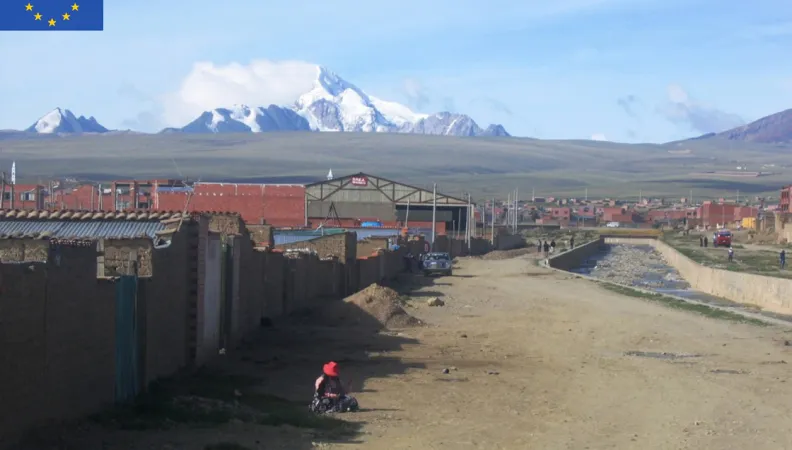 Legal notice EU (project) Inequalities in urban water services are often perceived simplistically, according to a binary interpretation of “access/non-access,” with an end goal of making access to this public service universal. In other words, the issue has long been to ensure that all inhabitants enjoy access to water via a public service. This is all the more true in Bolivia, where water is considered as a “common good” subject to a principle of “non-commodification,” written in the country’s constitution since 2009. But the 2016 water crisis in La Paz has highlighted a new type of inequality in terms of water-supply service. During that drought episode, it was the inhabitants of the neighborhoods in the southern part of La Paz, where people from the middle and upper classes live, who were more exposed to the weakness of the main system of water access and who were deprived of water service. This shows one of the many possible variations in inequality in urban water services, the analysis of which requires going beyond just the question of technical access to the network.
Legal notice EU (project) Inequalities in urban water services are often perceived simplistically, according to a binary interpretation of “access/non-access,” with an end goal of making access to this public service universal. In other words, the issue has long been to ensure that all inhabitants enjoy access to water via a public service. This is all the more true in Bolivia, where water is considered as a “common good” subject to a principle of “non-commodification,” written in the country’s constitution since 2009. But the 2016 water crisis in La Paz has highlighted a new type of inequality in terms of water-supply service. During that drought episode, it was the inhabitants of the neighborhoods in the southern part of La Paz, where people from the middle and upper classes live, who were more exposed to the weakness of the main system of water access and who were deprived of water service. This shows one of the many possible variations in inequality in urban water services, the analysis of which requires going beyond just the question of technical access to the network.
Context
In 2015, the level of access to “improved” water services in Bolivian cities was 97%, while that of wastewater treatment services was limited to 61%. Beyond these general data, the available data on the rates of access to water-supply services does not necessarily reveal other types of urban inequality related to water. Such inequality concerns not just technical access to the network, which, incidentally, is easily recognizable on a servicing map.
They also involve, for example, the question of inequality linked to payment for the service. This type of data is more difficult to obtain, because it is linked to household composition, usage practices, consumption level, and of course income. Another type of inequality arises from the nature of the service provider. The public water service is not the only form of provision of service in cities: there are also small socio-technical systems decentralized at the neighborhood level, which sometimes substitute for the main system or provide supplementary service. They generally offer basic service of acceptable quality and with lower rates, but require active participation by users in collective maintenance work. In addition, a new aspect of inequality is related to the location of some households more exposed than others to the weakness of the main system. This phenomenon was clearly seen during the 2016 water crisis in La Paz, whose southern neighborhoods were deprived of water service for several weeks. Other factors of inequality can be identified, such as the political tendency or social-mobilization capacity of some networks. These factors can sometimes act as real comparative advantages that can sometimes constitute real comparative advantages in the priorities of access to water services and sanitation.
This project is part of the first phase of the Research Facility on Inequalities, coordinated by AFD and funded by the European Commission's Directorate-General for International Partnerships over the 2017-2020 period. The first phase of the Facility has led to the conduct of 22 research projects and the publication of around 100 research papers and policy briefs.
Goal
This research project is being led by a multidisciplinary team under the coordination of CIDES-UMSA. It seeks to examine and analyze the various types of inequality linked to water and sanitation services in La Paz-El Alto, as well as their trends in recent years, above and beyond the typical determinants such as income (vertical inequalities) and localization (spatial inequalities). In fact, the researchers are also interested in other, less-studied types of determinants, such as exposure to climate change, social representations, and political resources, all of which can affect social cohesion. The objective is to obtain a new interpretation of urban inequalities in La Paz-El Alto, in order to fuel dialog with municipal and sectoral authorities.
This project also seeks to support Bolivian research, through training, methodology workshops, and participation in international conferences, etc.
Method
This research project follows a multi-disciplinary and multi-theme approach that combines qualitative field surveys covering different areas of the two cities, on key subjects related to i) inequality in water services (trends in services on the urban fringe, small-scale systems, socio-political resources in neighborhoods, shared uses of water in the city, etc.), ii) historical analyses (how inequality in the services started), and iii) statistical analyses. The approach also involves working in connection with the municipal research services. The results from these different surveys and analyses will be discussed regularly at workshops for sharing experiences.
Results
Find the presentation of the research paper “Inequalities related to urban water services in La Paz-El Alto, Bolivia” by Sarah Botton (AFD research officer) and Patricia Urquieta (CIDES-UMSA researcher) during the third webinar of the Research Facility on Inequalities:
You may find the research papers linked to this project here:
- An overview of inequalities in urban water services in Bolivia
- Conflicts and tensions over water ownership in the territory of the urban-rural interface of Hampaturi, municipality of La Paz
- When governance fails: institutional asymmetries in water management in the municipality of La Paz
- Landscape of springs and collective outdoor laundries in the city of La Paz
- The ‘urbanization of water’ in La Paz, Bolivia: historical and conceptual perspectives
- Persistence of inequality in access to water: a look at the actions of women in peri-urban territories of the city of El Alto
- Territorial inequalities expressed in children's health in two neighborhoods with access to water in the city of El Alto
- Corporate citizenship and water urbanization on the outskirts of El Alto
You may find the policy briefs here:
- Springs and collective laundries in the City of La Paz, notes for their management
- Access to water : persistence of inequalities in the life of women
- Municipal planning and inter-institutional coordination for good water management
- Water and Sanitation works with Neighborhood Participation: regulated and transparent
- Water provision and management of urban-rural interface territories
- Water in the city of El Alto, a right that arrives incomplete
Contact:
- Sarah Botton, Research Officer, AFD
- Patricia Urquieta, CIDES-UMSA
Contactos:
- Sarah Botton, coordinadora de investigación en la AFD
- Patricia Urquieta, profesora-investigadora CIDES-UMSA


